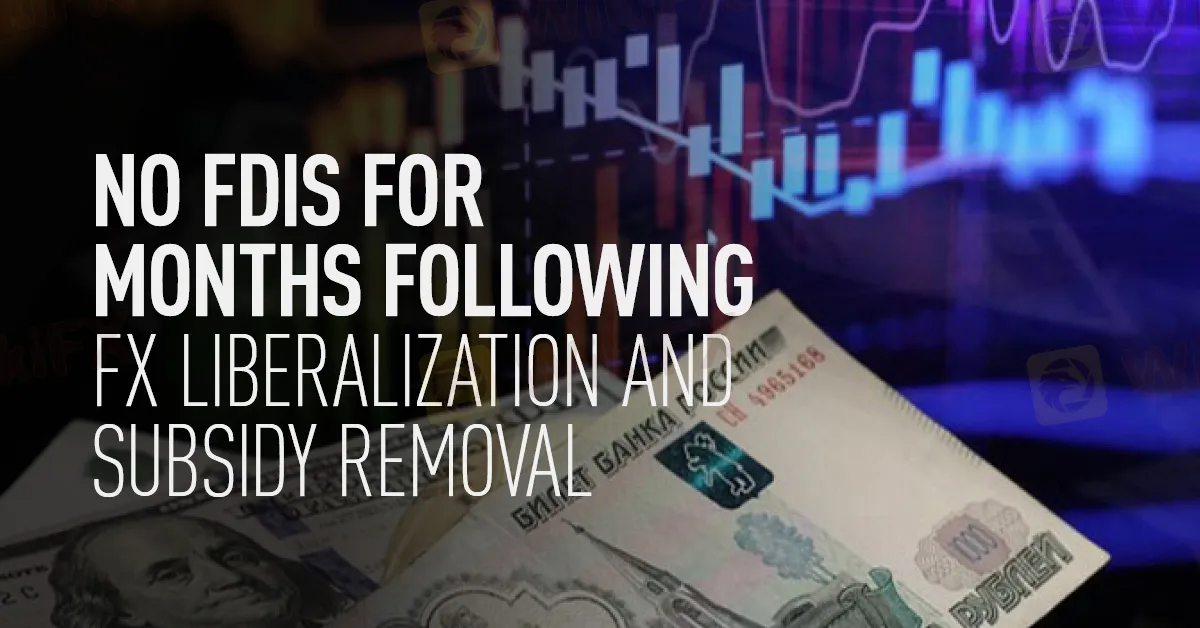Abstract:Multinational corporations are leaving the nation six months after the foreign exchange market was liberalized and gasoline subsidies were removed. Despite this, there is no indication of foreign direct investment (FDI).

· FDIs Can't Attract to Nigeria Due to Weak Purchasing Power, Say Analysts
Multinational corporations are leaving the nation six months after the foreign exchange market was liberalized and gasoline subsidies were removed. Despite this, there is no indication of foreign direct investment (FDI).
The administration of President Bola Ahmed Tinubu was hopeful that these measures would attract the crucial foreign investments to the nation.
The business-based Investors and Exporters (I&E) window replaced the previously existing multiple exchange rate windows, which were abolished by the Central Bank of Nigeria (CBN). Nonetheless, the scarcity of foreign cash continues despite the CBN's devaluation and unification of foreign exchange.
This may have had an impact on multinational corporations whose operations relied heavily on the availability of foreign exchange and the declining purchasing power of Nigerians due to rising inflation.
According to Daily Independent investigations, while some Nigerian corporations are ruining their exit, others are intending to leave the nation.
Their incapacity to return the money they had stashed in the nation was the primary cause of their departure.
Companies like Unilever, GSK Plc, Sanofi-Aventi Nigeria, Bolt Food, Jumia Food, Equinor, and Procter & Gamble (P&G) had already left the nation as of the last count. In general, 2023 was a difficult year for companies in Nigeria because no fewer than seven global corporations either departed or made their departure from the nation known.
While some of these businesses are closing their doors barely three years after declaring their debut, many of these businesses have been operating in Nigeria for decades.
Prior to 2023, the Nigerian government's strict laws, power outages, currency volatility, and continuous devaluation of the naira posed a number of difficulties for both domestic and foreign firms operating in the country. The Director-General of the Manufacturers Association of Nigeria (MAN), Segun Ajayi-Kadir, responded to the mass departure by stating that more businesses would depart due to the difficult environment in which manufacturers work.
“Clearly, we are saddened by P&G's departure, but it is not entirely unexpected, and more may occur as we undoubtedly operate in a challenging environment,” Ajayi-Kadir stated.
He said that the government should learn a lesson from the departure of multinational corporations about prioritizing local manufacturers, stating that “if you have a challenged local manufacturer, he is not likely to go anywhere.”
Financial expert and advisor Dr. Abubakar Jindim, of Abuja, stated that the primary reason Nigeria has not been able to draw in the much-needed FDIs is because Nigerians' purchasing power is weakening.
“Foreign investors are wise people,” he declared. They are aware of the current events in the nation. In addition to instances of insecurity, they fear that the nation's common populace is lamenting hunger and that the pace of inflation is not decreasing. I refuse to invest my money in a system where the populace is both impoverished and has limited purchasing power. Therefore, it will take longer for Nigerians to start seeing foreign investments.
Economist Stephen Iloba, who is located in Lagos, stated that it is too late for the Federal Government to reverse FX liberalization and terminate petroleum subsidies in response to inquiries about the viability of doing so.
“I believe that the Federal Government cannot afford to pause these programs at this point. It's late because there won't be a meaningful resolution. If they go with that option, the entire nation will come to a standstill. ”I will propose enabling the federal government to implement the policies and see them through to completion. Although it will be difficult, things might get better. Although changes might not be possible in the upcoming year, they will undoubtedly occur when we adjust, the speaker stated.
According to Cyril Ampka, the Federal Government and the CBN should stick to their existing course of involvement in the forex market and full settlement of the outstanding forex debt owing to airlines and multinational corporations.
“The Federal Government and CBN should ensure that no stone is left unturned,” he declared. I anticipate that the MPC will raise rates this month in order to keep up with inflation.
The United Capital analysts said in a research released over the weekend that the MPC must raise interest rates this month since inflation has been persistently high since 2016.
“The naira devaluation and elimination of fuel subsidies resulted in an average inflation rate of 25.0%, with gasoline prices increasing by 210.3% year over year.” The annual rate of inflation reached 28.2 percent in November 2023. In October, food and core inflation increased to 22.6 percent and 31.5 percent year over year.
The MPC took a hawkish stance, increasing the MPR by 725bps to 18.75 percent and resuming OMO operations. Reforms led to an improved fiscal climate in the latter half of 2023. The predicted increase in net oil revenues did not materialize because of the poor oil production. Therefore, in 2023, the urge to spend remained high.
The researchers predicted that the monetary policy rate (MPR) would rise by 125 basis points, to reach 20.0 percent by the beginning of 2024.










